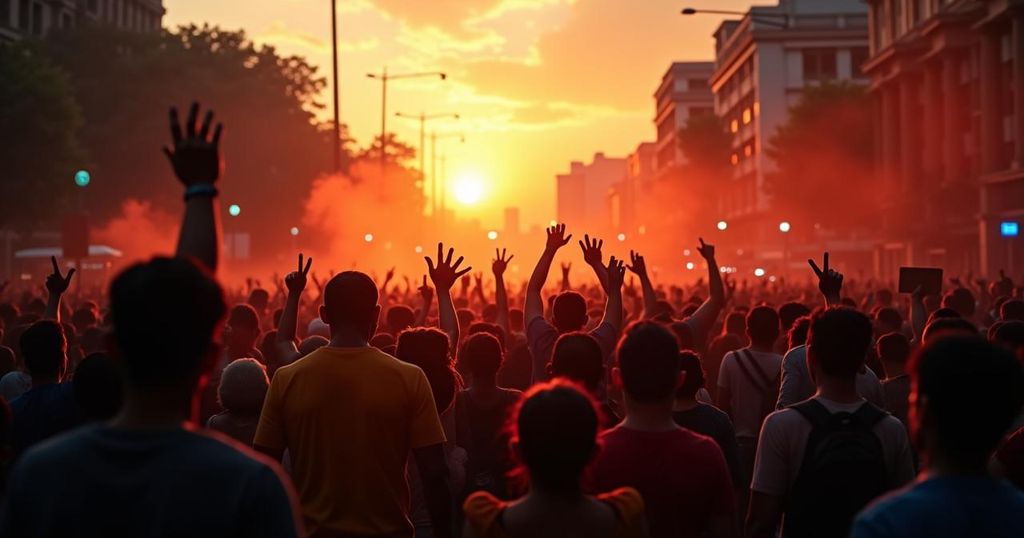Opposition protests emerged in Venezuela two months after President Maduro’s disputed election victory claim. Led by figures like Maria Corina Machado, the protests express rejection of Maduro’s authority, citing election fraud. Despite government crackdowns, demonstrators advocate for democratic rights and continued resistance, as international voices urge dialogue for transitional governance.
On Saturday, small gatherings of opposition protesters took place in Venezuela, coinciding with two months since President Nicolas Maduro declared victory in the contentious presidential election. Opposition leader Maria Corina Machado, currently in hiding after denouncing the election results as fraudulent, urged supporters to hold smaller meetings to evade the security crackdowns seen during previous demonstrations. In a Caracas plaza, approximately thirty individuals rallied, including Leida Brito, affectionately known as the “Red Helmet Grandmother” for her long-standing anti-government activism, who asserted, “Nicolas Maduro should leave because he lost,” while proudly displaying a sign that articulated, “To defend the vote is a right.” Also present was retired colonel Hidalgo Valero, who expressed concern for the situation in Venezuela, stating, “The freedom of Venezuela is in danger. Today our people are afraid to be in the streets because there is tremendous repression.” Maria Corina Machado communicated with her supporters through a voice note released by her team, emphasizing, “Here we are standing firm, advancing every day with more strength and enthusiasm, gathered here as the brave and good Venezuela.” In the wake of the disputed election, dozens of opposition leaders have faced arrest, with over 2,400 Venezuelans accused of terrorism for purportedly participating in protests following the electoral disturbances which resulted in twenty-seven fatalities. The opposition alleges that its candidate, Edmundo Gonzalez Urrutia, rightfully won the July 28 election by securing 67% of the votes, announcing their own count derived from polling station results. Conversely, the pro-government National Electoral Council declared Maduro as the victor, attributing him 52% of the votes, yet they have not released the detailed voting data as mandated by law. Gonzalez Urrutia, a 75-year-old retired diplomat, has sought asylum in Spain after spending weeks in hiding. Simultaneously, larger protests unfolded internationally, with demonstrations in cities including Mexico City, Buenos Aires, Panama City, and Montevideo. In Madrid, Gonzalez Urrutia addressed a gathering of supporters waving the Venezuelan flag. Conversely, hundreds of Maduro supporters marched in Caracas to celebrate his election win. Maduro mocked Machado during these proceedings, stating, “the supposed queen bee…is beginning to pack her Gucci suitcases…she is preparing to leave, too,” asserting, “We are not in Madrid, we are not hiding, we are in the street.” Following these events, approximately thirty nations, led by the United States and Argentina, issued a statement urging Maduro to engage in constructive dialogue with the opposition, advocating for “constructive and inclusive discussions” regarding a democratic transition and calling for the immediate release of Venezuelans detained amidst the election’s aftermath.
The protests in Venezuela result from widespread discontent regarding the legitimacy of the recent presidential election held on July 28, where President Nicolas Maduro claimed victory amid accusations of electoral fraud. Following the election, opposition figures, including Maria Corina Machado and multiple leaders from the opposition coalition, challenged the reported results and have faced significant backlash from the government, including arrests and violence against protestors. The political atmosphere in Venezuela remains tense as the opposition continues to mobilize resistance against a government they deem illegitimate. International attention is focused on the situation, with several countries calling for dialogue and a peaceful resolution to the crisis.
The ongoing protests in Venezuela, spearheaded by opposition groups and supported by international outcry, highlight the country’s severe political divisions following the disputed presidential election. With ongoing repression against dissenters and calls for dialogue, the future of Venezuelan democracy hangs in a precarious balance. The actions taken by both the opposition and the Maduro administration will significantly influence the path forward for the nation and its citizens.
Original Source: www.voanews.com






